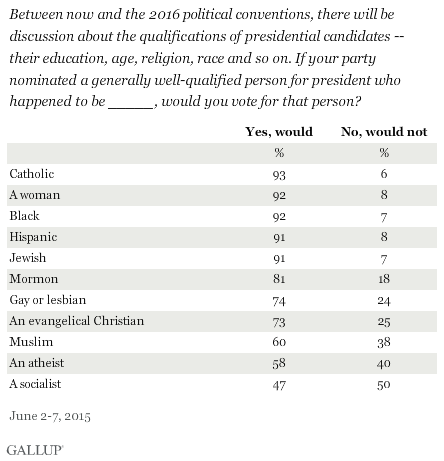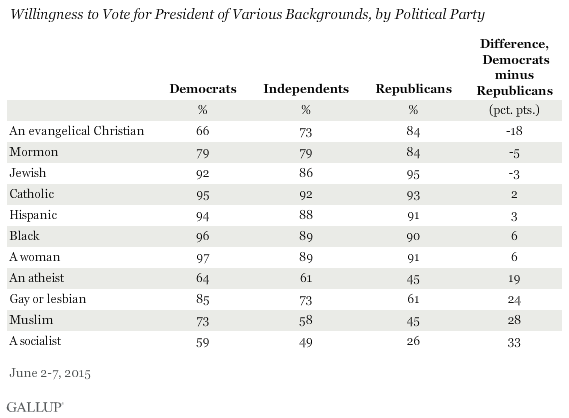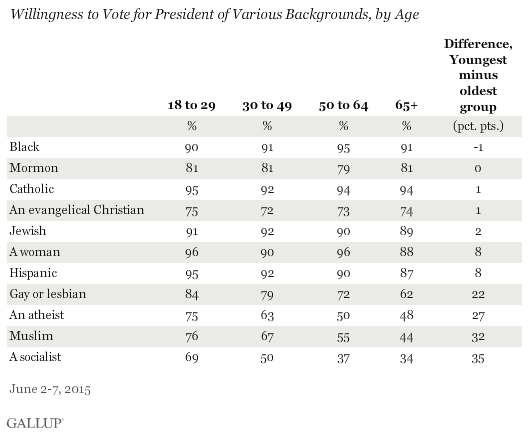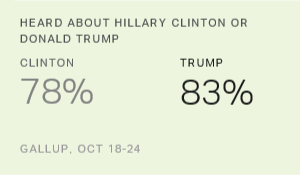Story Highlights
- More than nine in 10 would vote for a Catholic, black, or woman
- Ninety-one percent would vote for a Jewish or Hispanic candidate
- Americans show most bias toward socialists (47%), atheists (58%)
WASHINGTON, D.C. -- As the 2016 presidential election field takes shape, more than nine in 10 Americans say they would vote for a qualified presidential candidate who is Catholic, a woman, black, Hispanic or Jewish. Less than half of Americans would vote for a candidate who is a socialist.

A June 2-7 Gallup poll updated the question -- first asked in 1937 -- about the acceptability of presidential candidates of various background characteristics. The general trend is that Americans have become significantly more accepting over time.
Among religious identities, while the large majority of Americans would vote for a Catholic or Jewish presidential candidate, smaller majorities say they would vote for a candidate who is Mormon (81%), an evangelical Christian (73%), Muslim (60%) or an atheist (58%).
These dynamics can affect 2016 candidates' efforts to attract American voters in the upcoming primaries as well as the general election next year, particularly because the field is shaping up as one that will have some diversity in terms of race, gender and, particularly, religion.
Five declared candidates are Catholics -- Republicans Jeb Bush, George Pataki, Marco Rubio and Rick Santorum, and Democrat Martin O'Malley. Two are women -- Democratic front-runner Hillary Clinton and Republican Carly Fiorina. Republican Ben Carson is the sole black candidate in the race, while two candidates are Hispanic -- Republicans Rubio and Ted Cruz.
Independent Bernie Sanders, who is seeking the Democratic nomination, is the only Jewish candidate in the race. And while a large majority of Americans are willing to vote for a candidate of his faith, Sanders' self-identification as a socialist could hurt him, as half of Americans say they would not vote for someone with that background.
In addition, several candidates have heavily courted the evangelical community -- including Republicans Mike Huckabee, Rick Perry, Carson, Santorum and Cruz.
Democrats and Republicans Vary in Support for Candidates From Religious Groups
Democrats and Republicans vary in their support for candidates of particular religious affiliations.
Republicans (84%) are significantly more likely than Democrats (66%) to say they will vote for an evangelical candidate. But Democrats are more likely to say they will vote for a Muslim (73%) or an atheist (64%) than are Republicans, of whom less than half say they are willing to vote for a candidate with either of these belief systems.

Republicans and Democrats differ most in their willingness to vote for a socialist candidate, by 33 percentage points, but socialist ranks last for both parties. The two parties also differ significantly on voting for a gay or lesbian candidate, by 24 points. Majorities of Democrats are willing to vote for a candidate with any of the characteristics mentioned in the poll.
There are no meaningful party differences in willingness to vote for a female, black or Hispanic candidate.
Americans Under 30 the Least Particular on Candidate Characteristics
Gallup also finds wide differences in support for gay or lesbian, atheist, Muslim and socialist presidential candidates by age. Americans between the ages of 18 and 29 are much more likely than those 65 and older to support these four types of candidates. Younger Americans are also slightly more likely to say they will vote for women and Hispanics, by eight points each.
At least two-thirds of adults younger than 30 say they are willing to vote for a candidate with any of the characteristics included in the survey.

Bottom Line
With more than a dozen candidates running for president, the 2016 field is one of the most diverse Americans have ever seen. On the heels of the historic election and re-election of the nation's first black president, Americans are just as likely to lend their support to black candidates as to women and Hispanics. This suggests that another historic election could be on the horizon with Hillary Clinton, Carly Fiorina, Rubio and Cruz in the race.
Americans' notions about whom they would give their support to are widening, but they are still less than fully supportive of candidates with certain characteristics.
The news is likely worst for Sen. Bernie Sanders. At one point, Americans might have withheld their votes from him because of his Jewish faith -- fewer than half said they would support a Jewish candidate in 1937 -- but today his socialist ideology, given Americans' views on voting for a socialist candidate, could hinder his candidacy more.
To a lesser degree, evangelical Christian candidates may suffer, in that one in four Americans say they will not vote for an evangelical Christian. Candidates of various faiths who court American evangelicals, like Southern Baptists Cruz and Huckabee, or Catholic Santorum, could suffer from their association with the evangelical faithful and the social issues they take firm stances on.
Survey Methods
Results for this Gallup poll are based on telephone interviews conducted June 2-7, 2015, with a random sample of 1,527 adults, aged 18 and older, living in all 50 U.S. states and the District of Columbia. For results based on the total sample of national adults, the margin of sampling error is ±3 percentage points at the 95% confidence level. All reported margins of sampling error include computed design effects for weighting.
Each sample of national adults includes a minimum quota of 50% cellphone respondents and 50% landline respondents, with additional minimum quotas by time zone within region. Landline and cellular telephone numbers are selected using random-digit-dial methods.
View survey methodology, complete question responses, and trends.
Learn more about how Gallup Poll Social Series works.

